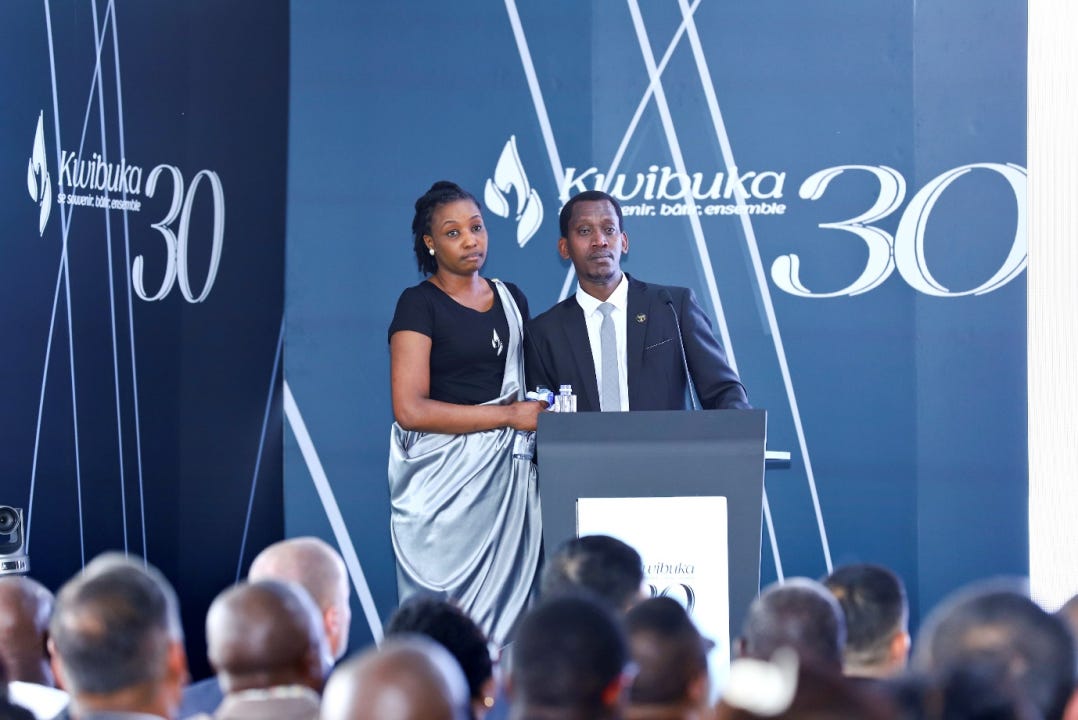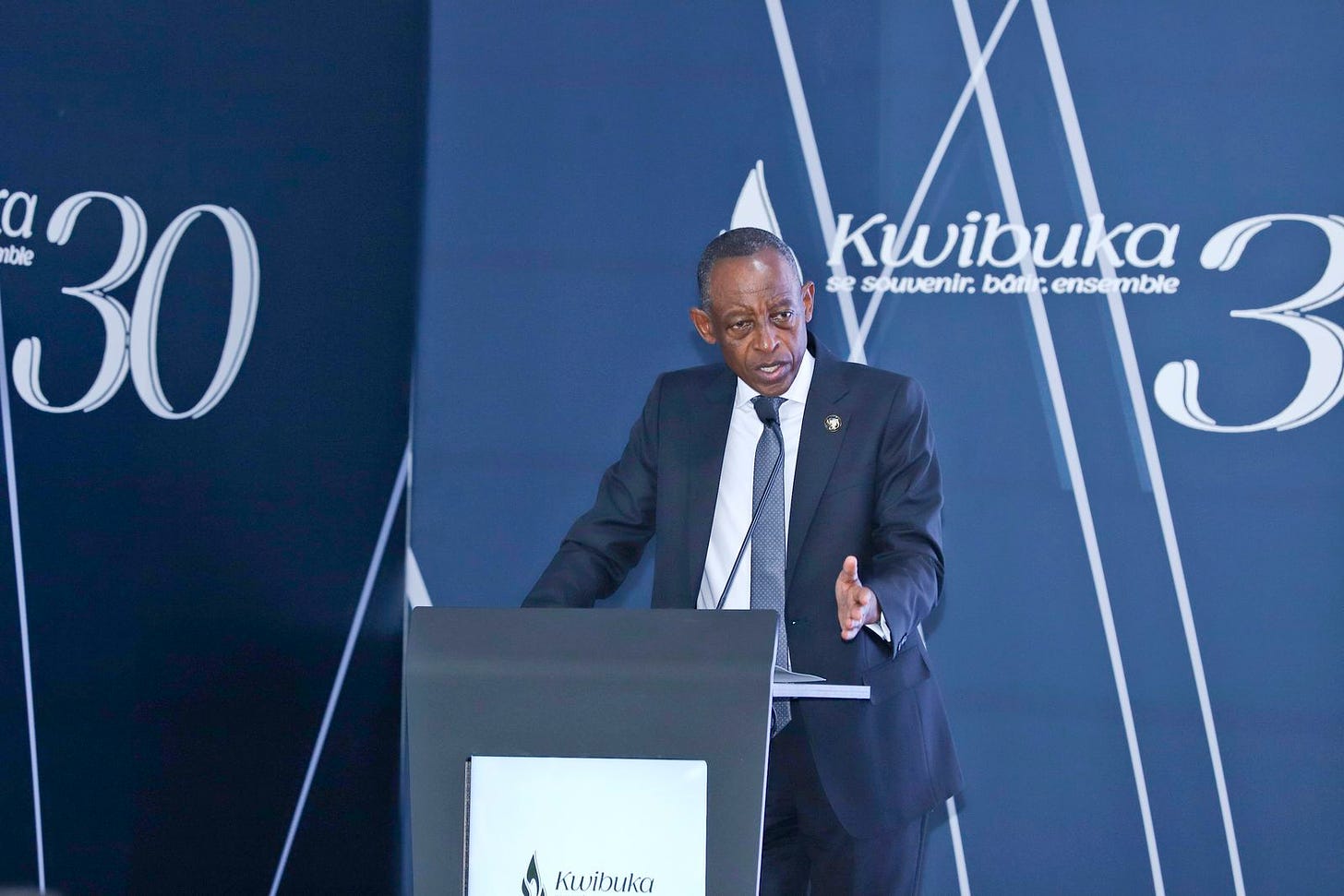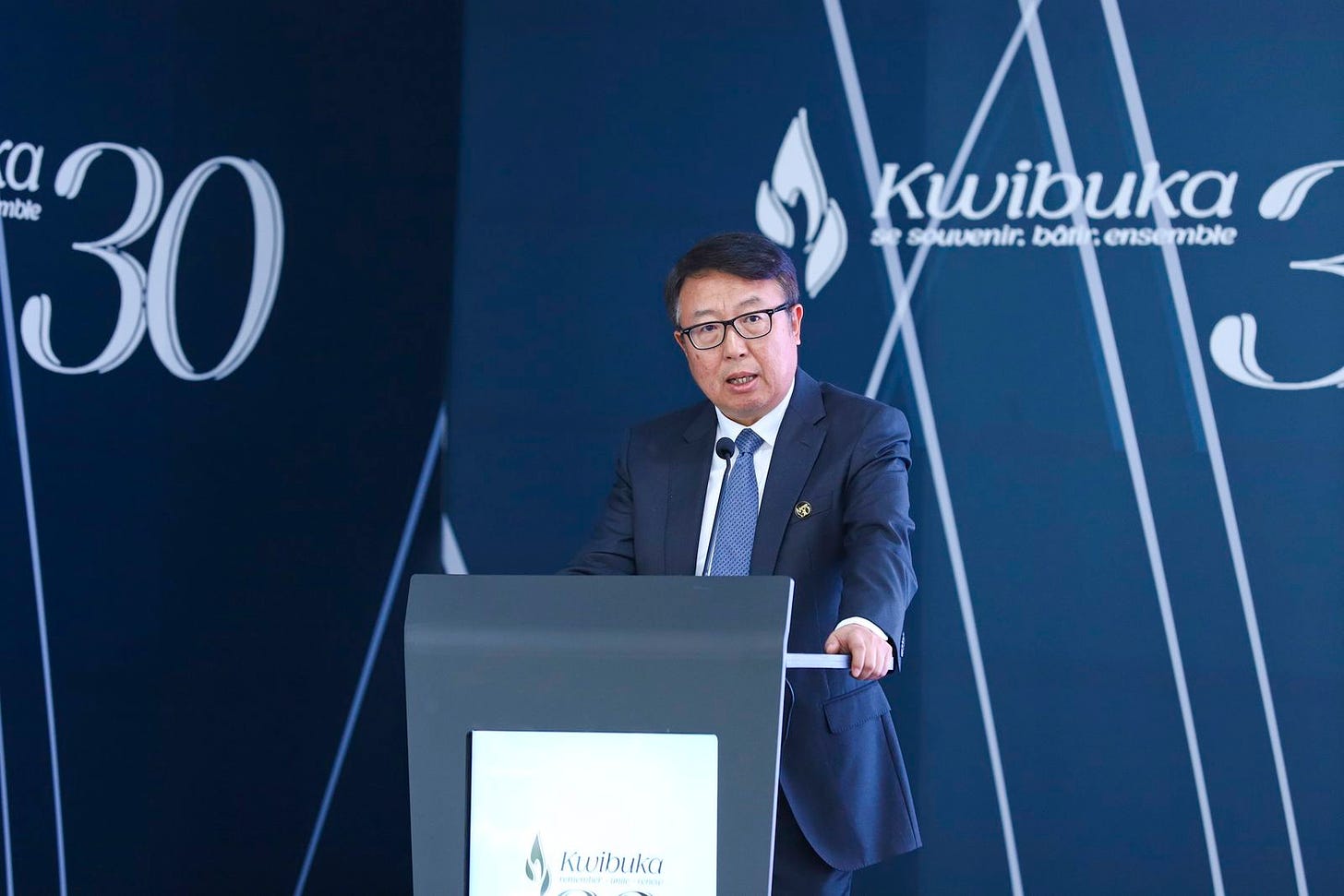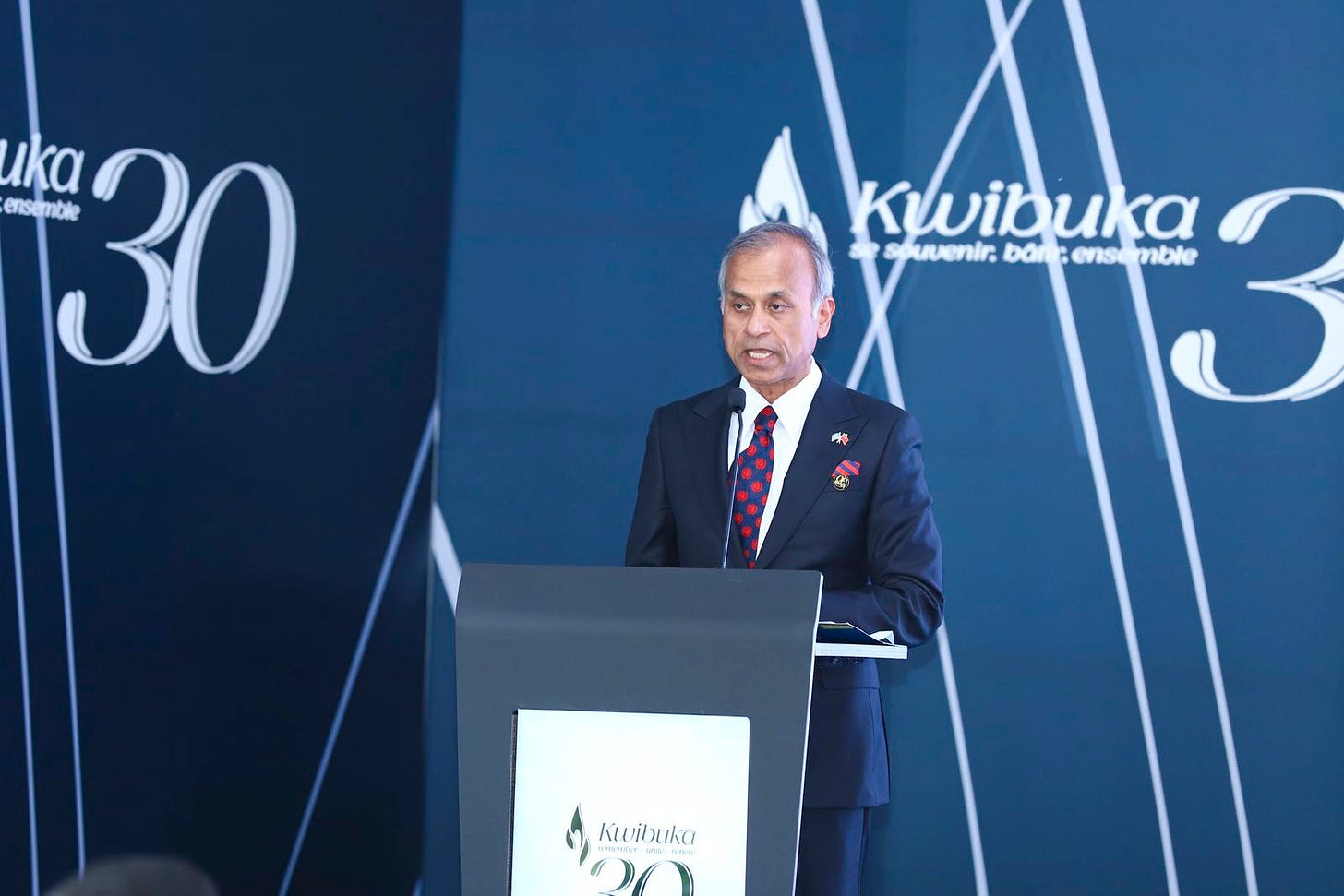Rwanda Commemorates 30 Years since the Genocide Against the Tutsi with Solidarity and Renewal in China
On Sunday, April 7, 2024, the 30th Commemoration of the 1994 Genocide Against the Tutsi in Rwanda (Kwibuka30) was held at the Embassy of Rwanda in Beijing under the theme Remember - Unite - Renew.
Hi, this is Yuxuan Jia in Beijing. On Sunday, April 7, 2024, the Embassy of the Republic of Rwanda in the People’s Republic of China commemorated the 30th anniversary of the 1994 Genocide Against the Tutsi under the theme Remember - Unite - Renew.
At the invitation of the Embassy of Rwanda in Beijing, representatives from the Center for China and Globalization (CCG) attended the commemoration. To disseminate information to a wider audience, the CCG Update is sharing key materials from this event, kindly provided by the Embassy of Rwanda.
As every year, Rwandans in China were joined by officials from the government of China, diplomatic envoys, representatives of international organizations, and friends of Rwanda to commemorate over a million lives that were lost in 1994.
Although it’s been 30 years, the wounds are still fresh for survivors.
Mr. Narcisse Mulinga, a survivor who was just 11 years old during the genocide shared his story of childhood discrimination and the loss of loved ones. He later thanked the Inkotanyi that stopped the genocide and gave him and so many survivors hope to live again.
“Today I am nearly done with my PhD in regional rural development at Anhui Agricultural University. The process of rebuilding myself continues. I am a man who has rebuilt himself. I am blessed to have a beautiful family including a 10 year old child.”
The story of Mr. Narcisse is a representation of many other survivors who refused to be defined by the past and chose to rebuild themselves as Ambassador James Kimonyo highlighted it.
"Despite the tragedy that befell our country, we stand as a testament to the strength and resilience of the human spirit. Our past has profoundly shaped and defined our future. We are a nation transformed, focused on development, opportunity, and a future where the words 'Never again' truly hold meaning," the Ambassador said.
The representative of the Government of the People’s Republic of China, Ambassador Wu Peng, conveyed a solidarity message to the people of Rwanda and survivors during this period of Kwibuka and made a commitment to continue supporting Rwanda’s transformation journey.

On behalf of the UN, Mr. Siddharth Chatterjee, the Resident Coordinator in China called for international community to reflect on the Genocide Against the Tutsi in Rwanda and warned of the rise of extremist groups and the inflammatory rhetoric that produced horrific consequences.
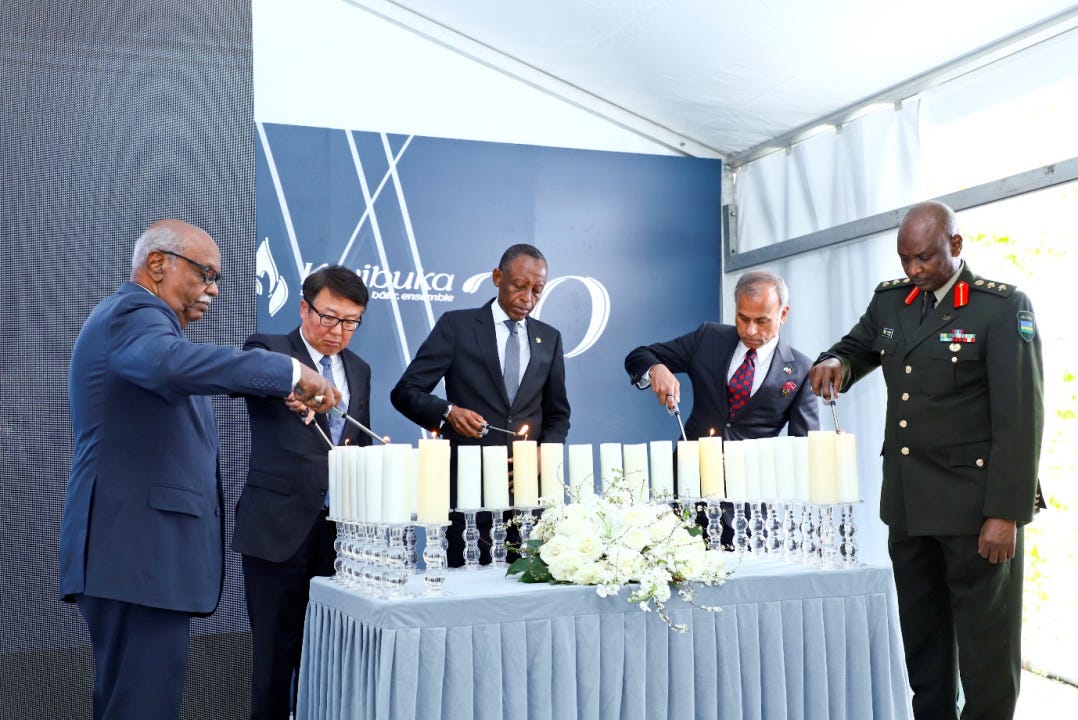
Ambassador Rahamtalla Mohamed Osman, the Permanent Representative of the African Union in China reminded the audience the worst moments Rwandans passed through and hailed Rwanda’s reconciliation journey after the 1994 Genocide Against the Tutsi.
The commemoration event was also marked by the screening of a documentary, candle lighting, and a poem titled ‘Rwanda: A Beacon of Light,’ performed by Rwandan students in China who shared inspiring messages reflecting what Rwanda has gone through and where the country is now, 30 years later.
Within the next 100 days, the Embassy and the Rwandan Community in China will continue to conduct commemoration activities in different provinces and cities.
Address by AMB. JAMES KIMONYO, the Ambassador of the Republic of Rwanda to China
Your Excellency Ambassador Wu Peng, Representative of the Government of the People’s Republic of China,
Your Excellency Mr. Siddharth Chatterjee, the Resident Coordinator of the United Nations in China
Your Excellency, Rahamtalla Mohamed Osman, the Permanent Representative of the AU to China
Excellencies Colleagues Ambassadors,
Heads of International Organizations,
Members of the Diplomatic Corps
Friends of Rwanda
Fellow Rwandans
Ladies and Gentlemen.
Good afternoon.
Let me begin by thanking all of you for taking time to join us on this 30th Commemoration of the 1994 Genocide Against the Tutsi in Rwanda.
On behalf of the Government of Rwanda, the Embassy and on my own behalf, I most sincerely wish to express our profound appreciation for the solidarity and support as we gather here today to honour and remember over one million innocent Tutsi who were brutally killed in a despicable crime of genocide.
The horrendous atrocities in the 1994 Genocide Against the Tutsi were meticulously planned and executed by the genocidal regime. We all know that genocide is neither an accident nor a coincidence, but rather a long-term extermination plan.
It doesn’t happen overnight- it is not spontaneous, it has stages, and its signals are there for everyone to see.
Excellences
Ladies and Gentlemen,
For those unfamiliar with the history of Rwanda, the seeds of hate and divisionism were sowed during the colonial period, where the divide-and-rule policy was practiced through issuance of ethnic identity cards based on constructed identities: Describing each person as Hutu, Tutsi or Twa, while in actual fact what existed were simply social classes because Rwandans are one people with one language, same culture, and practice same traditions.
These divisive politics gradually entrenched hate and deep divisions within Rwandan society that culminated in the atrocious Genocide against the Tutsi in 1994.
Thousands of Hutu militiamen, most of them young, were trained and equipped to execute the genocide with the objective to wipe out Tutsis in the shortest time possible.
From April 7th, 1994, until the Genocide was stopped in July 1994, the days were long, and nights were short for survivors. They went through horrible and agonizing ordeal of seeing family members hunted down and killed in front of their eyes.
Perpetrators had no an iota of mercy, they slaughtered people like chickens-raped- banged babies against solid objects-they did all manner of callous things without sparing anyone, -young- elderly- disabled, even pregnant women.
The scale and magnitude of the killings were staggering, over one million people were brutally murdered in 100 days. It is actually estimated that 10,000 people were murdered every single day!
Excellences
Dear Friends,
I am sure many of you are still unable to comprehend this degree of madness, the depravation and devastation.
But we can agree that this unspeakable horror, mirrors the disastrous failure of humanity. What is more troubling though is that, this insanity was avoidable!
The killers were mostly armed with rudimentary weapons- and were poorly trained which would not have posed tough resistance to any intervention.
They could have been deterred from causing mayhem of such unimaginable magnitude.
The Canadian General Romeo Dallaire, who was the commander of the United Nations Force stationed in Rwanda, gives us a unique account of what happened.
In the months leading to the genocide, he had received overwhelming information with concrete evidence that there was a genocide that was being plotted to exterminate the Tutsi population.
He then appealed to the United Nations and world leaders to authorize reinforcement in terms of more troops and equipment.
The response was Refusal-Total Refusal. He was instead ordered to withdraw all the troops and leave a few behind to undertake only one exclusive operation: The evacuation of foreigners. Leaving the victims at the mercy of their killers!
Out of bravery, the Ghanaian soldiers under former Deputy Force Commander General Henry Kwami Anyidoho, disobeyed the UN order and stayed behind to rescue whoever they could.
Captain Mbaye Diagne from Senegal also defied the order to leave and sacrificed his life during lifesaving operations.
These African heroes demonstrated that it was indeed possible to save lives HAD the United Nations authorized reinforcement of its contingent in Rwanda.
Excellences
Dear Friends
When the world became totally indifferent, brave men and women of the Rwanda Patriotic Army, led by H.E President Paul Kagame, stood up and marched to put an end to the carnage. We pay tribute to the fallen heroes who paid the ultimate price during the campaign against the genocide.
The compelling testimony full of shocking details we heard from Mulinga Narcisse, gives us heart breaking account of the kind of agony many survivors went through. They lost family members, friends, relatives and everything dear to them.
But in the words of our President His Excellency Paul Kagame, “You may have lost your loved ones but there is one family you did not lose: your country”. The nation of Rwanda is a family for all survivors and every Rwandan.
Your resilience and bravery embody the triumph of the Rwandan character in its purest form.
Excellencies,
Ladies and gentlemen.
Despite this tragedy that befell our country. We stand as a testament to the strength of human spirit and resilience. Our past has profoundly shaped and defined our future.
We are a nation transformed and focused on development, opportunity, and a future where the words ‘Never again” truly hold meaning.
We cannot allow ourselves to turn back! The ideals and values that Rwandans of today cherish are built on the long history of unity which is a bedrock of who we are today and who we are determined to be tomorrow.
Excellences
Dear Friends,
Before I conclude, let me call upon the international community to fight the spread of hate speech, genocide ideology, denial and bring to book all the perpetrators residing and working in different countries. The commitment to never again should not be an obligation but the true claim to uphold humanity.
To all fellow Rwandans, especially the youth, the responsibility lies on our shoulders to preserve the memory, uphold our unity, safeguard, and accelerate the progress of our country.
Let’s remember, unite, and renew.
I thank you for your attention and may God bless you all!
Remarks by Am. Wu Peng, Representative of the Government of the People’s Republic of China
Your Excellency Ambassador James Kimonyo,
Ladies and Gentlemen,
On the occasion of the 30th commemoration of the 1994 Genocide against the Tutsi in Rwanda, please allow me to begin by mourning all the lives lost in the genocide 30 years ago and expressing my deep sympathy and condolences to the Rwandan people.
The tragedy of 1994 not only inflict sufferings upon the Rwandan people, but also taught the international community a painful lesson. The UN General Assembly adopted resolutions, designating April 7 as the “International Day of Reflection on the 1994 Genocide against the Tutsi in Rwanda”, a reminder for future generations to remember history and cherish peace. This is also why we are having this commemorative event here today.
It is gratifying to see that, under the leadership of President Paul Kagame, the Rwandan government and people have put the dark clouds of history behind them, achieved national reconciliation, and explored a development path that suits their national conditions. The country has successfully maintained national stability and social harmony and realized rapid economic growth. Its achievements are widely recognized. Rwanda is a fine example of war-torn countries emerging stronger. China sincerely wishes Rwanda new and greater progress on its path of development and revitalization. We will continue to support Rwanda in following a development path compatible with its realities, further deepen bilateral relations and promote practical cooperation for greater benefits of our two peoples.
Ladies and Gentlemen,
The year 2024 is a big year for China-Africa cooperation. The Forum on China-Africa Cooperation (FOCAC) will meet in China this autumn. Chinese and African leaders will once again gather in Beijing after six years to discuss future development and cooperation and share governance experience. This will open a new chapter for accelerated efforts toward the China-Africa community with a shared future. The African continent is now at a critical stage of peace and development. African countries are experiencing a new awakening. Models imposed from outside did not bring stability or prosperity. It is essential that countries on the continent explore development paths suited to their national conditions and hold their future and destiny firmly in their own hands. China always views and develops its relations with Africa from a strategic and long-term perspective. We will continue to stand firmly with our African brothers, support an Africa that is truly independent in thinking and ideas, help Africa build capacity for self-driven development, and support faster modernization in Africa.
May the people of Rwanda enjoy peace and happiness!
May China-Rwanda and China-Africa friendship last forever!
Thank you!
Address by Mr. Siddharth Chatterjee, Resident Coordinator of the United Nations in China
MESSAGE FOR THE INTERNATIONAL DAY OF REFLECTION ON THE 1994 GENOCIDE AGAINST THE TUTSI IN RWANDA, 7 April 2024
On this day in 1994, and for the nearly 100 days that followed, one million Tutsi children, women and men were killed by their fellow Rwandans.
Families turned against families, friends became foes, and a dark spirit of intentional and brutal violence engulfed a nation.
We will never forget the victims of this genocide. Nor will we ever forget the bravery and resilience of those who survived, whose courage and willingness to forgive remain a burst of light and hope amidst this dark chapter in human history.
This year, we remind ourselves of genocide’s rancid root: hate.
We can draw a straight line between the senseless slaughter of one million Tutsi — as well as some Hutu and others who opposed the genocide — and the decades of hate speech that preceded it, enflamed by ethnic tensions and the long shadow of colonialism.
Today, around the world, the darkest impulses of humanity are being awakened once more by the voices of extremism, division and hate.
To those who would seek to divide us, we must deliver a clear, unequivocal and urgent message: never again.
On this solemn day of remembrance, let’s pledge to stand as one against all forms of hatred and discrimination.
Let’s ensure that the acts that began on April 7, 1994 are never forgotten — and never repeated. Anywhere.
Remarks of Amb. Rahamtalla M. Osman, Permanent Representative of the AU to China
Your Excellency Ambassador James Kimonyo
Excellency Mr. Wu Peng, Director General of the Department of the African Affairs, MFA
Excellency Siddharth Chatterjee, UN Resident Coordinator,
Excellencies,
Distinguished participants,
Ladies and gentlemen;
The Genocide against the Tutsi in Rwanda, launched on 7 April 1994, resulted in up to one million dead in 3 months; Death in atrocious and indescribable conditions and neither women nor children, not even newborns, were spared. Words will never be strong enough to describe this appalling tragedy whose 30th Anniversary we are marking today.
Each year, the African Union, in cooperation with the Government of Rwanda, makes it a duty to recall this unspeakable event. It aims at this triple objective, to:
- Remember to never forget, but also never to start again;
- Unite to commemorate the victims together and especially to refuse revisionism and hate speech.
- and to reiterate Africa’s solidarity with a country and a people permanently marked by a terrible tragedy.
Such is the significance that we accord this ceremony, and your presence is a wonderful comfort for the people of Rwanda, who have been demonstrated courage, resilience and tolerance in the last 30 years.
These qualities served as a leaven for the reconstruction of the country and the psychological and moral rehabilitation of its people.
Ladies and Gentlemen,
The commemoration of the Genocide against the Tutsi in Rwanda is an opportunity to draw the attention of African states to the magnitude of the threat as well as to our imperative obligation to oppose the self-destruction to which all these criminal practices lead. In doing so, that we all act in favor of peace, to silence the guns and subsequently place our countries, our Continent on the path of stability, security and progress.
Our States, under the coordination of the African Union, are tirelessly working to build the Africa we want, an integrated, prosperous and peaceful Africa. This action urges us to display additional commitment and courage to overcome our challenges, whether endogenous or exogenous.
From this point of view, Rwanda, under the leadership of President Paul Kagame, supported by a united people, a people welded together by the values of perseverance in effort and sacrifice, offers us the beautiful example of a country that has been able to transform its fragility into a powerful force for change.
The wounds of the genocide committed 30 years ago, which we still remember, continue to be healed thanks to tolerance, forgiveness and, above all, justice based on the country’s ancestral traditions, all of which have enabled Rwanda to reconcile, renew and regenerate itself.
Rwanda has achieved the unthinkable feat of getting back on its feet after having lived through a terrible disaster and almost being wiped out. In this respect, this commemoration is not only a manifestation of our solidarity with Rwanda but also an expression of our admiration for the authorities of this country who have achieved a salutary rebirth. May this rebirth, now crowned with many successes, be for us a source for pride and faith in the future of our continent.
I thank you.





